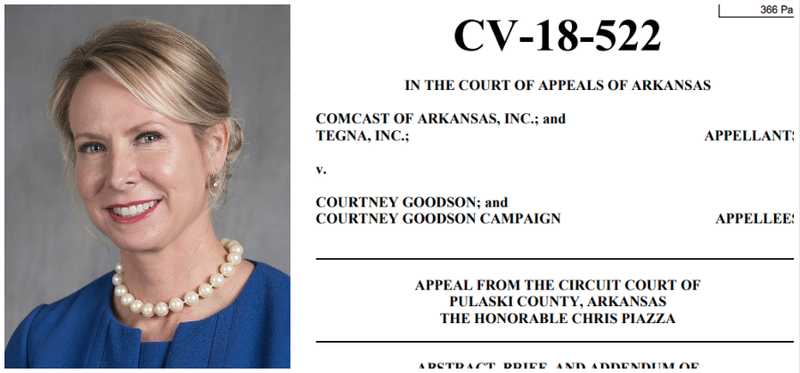In a court filing Monday, a Little Rock broadcaster claimed its free-speech rights were violated in May when a circuit judge barred it from airing ads harshly critical of Arkansas Supreme Court Justice Courtney Goodson.
The circuit judge's order to pull the ads is now on appeal to the state Supreme Court by Tegna Inc., the parent company of Little Rock TV station KTHV. Attorneys for Tegna filed the brief of their appeal Monday.
"By granting Goodson's request for a preliminary injunction, the Circuit Court silences campaign speech in the critical days before the election," wrote attorney John Tull in the brief.
Tull also serves as counsel for the Arkansas Press Association, which is not a party to the lawsuit. He said the decision by Pulaski County Circuit Judge Chris Piazza contradicted previous U.S. Supreme Court decisions regarding prior restraints on speech and set a harmful precedent.
"Failure to [reverse Piazza's decision] will result in a biennial flood of defamation suits from aggrieved political candidates across Arkansas, who will follow Goodson's lead and sue the press to silence speech harmful to their campaign," the brief stated.
Lauren Hoover, an attorney for Goodson, said Monday that the ads were not only unfair, they were false. The U.S. Supreme Court, she said, has also recognized the differences between nonpartisan judicial races and partisan campaigns. Hoover's reply brief is due in a month.
"What Tegna doesn't understand is there are political ads within the range of fair play," Hoover said. "You can't just go out and lie."
KTHV, or Channel 11, was one of several Arkansas TV stations that aired attack ads purchased by the Judicial Crisis Network, a conservative Washington, D.C.-based group that has inserted itself into several of the state's recent judicial races, which are nominally nonpartisan.
The group ran ads against Goodson during the spring primary season accusing the incumbent justice of accepting lavish gifts from attorneys while simultaneously seeking a raise. Goodson called the ads defamatory, stating that she has recused from all cases with conflicts of interest and that the requested raise was made by the whole court.
In the final weeks leading up to the May 22 election, Goodson filed lawsuits in Little Rock, Fort Smith and Fayetteville seeking to halt the ads. The justice has said she will recuse from any of her cases should they reach the Supreme Court.
Goodson succeeded initially in having the ads pulled in the Fayetteville market, only to have the case reassigned to Pulaski County due to conflicts, and the injunction overturned. At the same time the ads began running again in Northwest Arkansas, Piazza's decision halted them in Little Rock. The suit in Fort Smith was dismissed.
In addition to Tegna, the cable provider Comcast also signaled its desire to appeal Piazza's decision. But Comcast has since entered an agreement to not air the Judicial Crisis Network ads in the future and would not be a party to the Supreme Court appeal, Hoover said. Neither Comcast nor its attorneys commented on the nature of the agreement.
Marty Schack, the general manager at KTHV, did not respond to a request for comment on the station's plans regarding future ad purchased by the Judicial Crisis Network.
The May election ended with Goodson advancing to a runoff with attorney David Sterling, who was praised in several ads run by another out-of-state group. The runoff will be held along with other races on Nov. 6.
Metro on 07/31/2018
